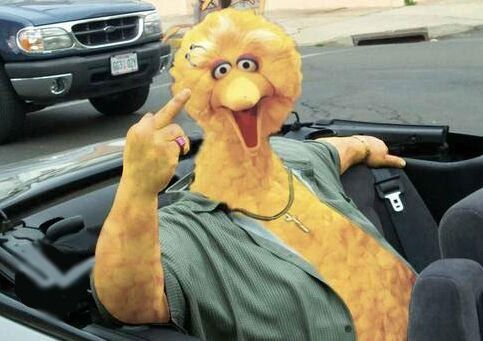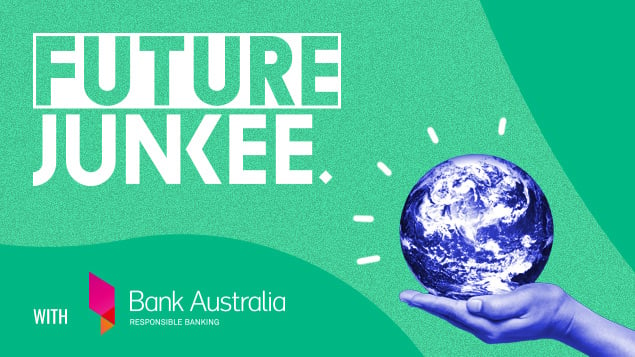Junk Explained: What’s Happening With Adani And Why Is It So Important
Where do the major parties stand? Who's fighting back? And what can you do to help?

UPDATE: Earlier today, the Queensland government gave the final tick of approval for the Adani coal mine to go ahead.
On Friday March 15, more than 1.5 million people took to the streets to demand meaningful action on climate change. Led by student activists inspired by 16-year-old Greta Thunberg, #SchoolStrikeForClimate protests took place in over 100 countries around the globe, it what’s been described as one of the largest environmental protests the world has ever seen.
Here in Australia, more than 150,000 people turned out, packing city streets and town squares. Many of the protesters wore their school uniforms and carried signs that looked an awful lot like they’d been made with supplies… uh… liberated from school art departments the nation over. But amidst the Simpsons memes and jokes about Marie Kondo, the most common placards featured a single hashtag, one that has become synonymous with the fight against climate change: #StopAdani.
According to the activist organisation that shares its name with the hashtag, the Adani Group’s proposed Carmichael coal mine in Queensland will release more than 4.6 billion tonnes of carbon dioxide into the atmosphere, contribute to the destruction of the Great Barrier Reef, and destroy the ancestral lands and waters of First Nations peoples. The mine has been condemned by leading climate scientists and hit with multiple legal challenges, and polling has repeatedly shown that a majority of Australians don’t want it to go ahead. And yet, thanks to recent approvals from the federal government, the Adani mine is now on the verge of becoming a reality.
Of course, as you’re probably aware, there’s an election in a few weeks. And Adani shapes up as one of the biggest issues on the ballot. So before you head to the polls on May 18, it’s worth knowing what’s happening with the mine, what’s at stake if it goes ahead, and what people can do to fight back.
What Is Adani?
The Adani Group is a massive Indian conglomerate that wants to build a coal mine in the Galilee basin in Central Queensland . The proposed Carmichael mine would be one of the biggest coal mines in Australia; according to Adani Mining CEO Lucas Dow, it would be capable of producing up to 27.5 million tonnes of coal a year.
Adani has long claimed that the mine would produce 10,000 much-needed jobs in north Queensland, but, even before the company’s plans for the project were scaled down, that just wasn’t true.
The mine has been in the works for almost a decade, and was originally meant to be even larger. But it ran into a hurdle when all four of Australia’s major banks ruled out providing funding for the project following pressure from environmental activists.
My boy the cutest #StopAdani banana says GO TO YOUR LOCAL #CLIMATESTRIKE EVENT THIS FRIDAY pic.twitter.com/s5yldz0pKr
— ? Liisa Rusanen (@liisa_sr) March 13, 2019
Adani is now planning to finance the mine itself, along with 200km of rail line that will be used to transport the coal from the mine to Abbot Point Port near Bowen and the Great Barrier Reef. From there the coal will be shipped to Asia and, eventually, its carbon emissions will be pumped into the atmosphere.
When people talk about stopping Adani, they’re generally talking about stopping the Carmichael mine. Which brings us to…
Why Do People Want To #StopAdani?
Climate change: it’s a thing.
The mining, burning and exporting of coal is a massive contributor to climate change, and if Adani gets its way, there’s probably going to be a whole lot more of it. The 4.6 billion tonnes of carbon dioxide sounds bad enough, but what’s worse is that the Carmichael mine will open up the Galilee basin for further exploitation. That means more mines, and more pollution.
“The science is so clear,” says Grace Vegesana, a coordinator with the Australian Youth Climate Coalition who has spent the past few years working on the group’s #StopAdani campaign. “We can’t afford to open up new coal mines or any other fossil fuel projects if we are to maintain a living planet. We need to set the precedent that we can’t have any more fossil fuels in Australia. Our climate can’t afford it, and our kids can’t afford it.”
Another major issue that you may have heard about recently relates to water. Specifically, groundwater plans approved by Environment Minister Melissa Price last month. It was the final tick Adani needed from the federal government, and will provide them with unlimited access to billions of litres of groundwater until 2077. This in a state that’s in the middle of a drought.
Price said she signed off on the proposal after receiving advice from Geoscience Australia and the CSIRO, only for it to emerge that the agencies had not seen Adani’s revised groundwater plans. Documents obtained by the ABC also indicated that the mining company refused to accept key recommendations from scientists.
Then there’s the timing of it all. Price gave the go ahead one day before the election was called. Had she waited any longer, the government would have been in caretaker mode and would have needed to consult Labor on the decision. It’s been reported that Price was being pressured by a number of her colleagues from Queensland, with senator James McGrath allegedly threatening to call for Price to be sacked if she didn’t sign off on the plan. “Super dodgy” is how Vegesana describes the process.
Did James McGrath threaten to call for Melissa Price’s sacking if she did not approve Adani? #QandA pic.twitter.com/TbFLSnLgmK
— ABC Q&A (@QandA) April 15, 2019
Another big concern about the mine relates to the rights of the traditional land owners. The Carmichael mine site is in close proximity to the Doongmabulla Springs, the most sacred site of the Wangan and Jagalingou people. According to Adrian Burragubba, a spokesperson for the Wangan and Jagalingou Traditional Owners Family Council, the mine “would pollute and drain billions of litres of groundwater, and obliterate our ancient springs”.
“The water is our life,” he said. “It is our dreaming and our sovereignty. We cannot give that away.”
The Fight Isn’t Over
Last year the Federal Court upheld Adani’s Indigenous Land Use Agreement, which means the Queensland state government can extinguish the native title rights of the Wangan and Jagalingou people. But the Family Council is appealing this ruling, and has sworn to take its fight to the High Court or even The Hague if need be.
That’s not the only potential legal issue Adani is faced with, either. While the federal government has signed off on the groundwater plan, The Queensland state government has yet to give its approval. Nor has it approved Adani’s species management plans for a colony of black-throated finch located near the mine site. And you’ve got to admit, it would be kind of delicious to see this multi-billion dollar project brought down by a couple of birds.

Still, while we’re rooting for our feathered friends, we’ll probably have more luck placing our faith in people. Young people in particular.
“Our lives are directly at stake,” says Vegesana. “Stopping the Adani coalmine [and] creating real political action on climate change means changing who has power in politics, and giving that power back to people. The history of social movements has shown that they create incredible, incredible change. So the AYCC’s focus is on empowering and organising young people across the continent to actually take action in their local communities and create that grassroots movement that shifts the narrative.”
.@billshortenmp These are your constituents, here tonight at the #ClimateElection forum in Maribyrnong! pic.twitter.com/hvDkVPrgLR
— AYCC (@AYCC) April 17, 2019
For groups like the AYCC, the federal election represents a massive opportunity.
“We’re running doorknocks, community forums, actions at MPs’ offices,” Vegesana tells us. “Every politician should be representing their people, and if they don’t know what their people want then they’re not going to take action. So it’s about making them aware of what their constituents want.”
“When you’re having 30 back-to-back meetings about climate change, or attending a climate assembly where you have 200 people from your electorate sitting in front of you waiting for your answer on what you’re going to be doing, that increases that sense of responsibility and accountability.”
What Can You Do To Help?
Well for starters, the AYCC are always looking for volunteers.
“Volunteering with your local AYCC or #StopAdani group is an awesome way to learn more,” says Vegesana. “You can learn campaigning skills and skills in your general life, and be part of really fun and creative action … and volunteering can look like anything from turning up at a rally to organising and running a local group for climate justice.”
Speaking of rallies, remember those striking school kids? Well they’ve actually got a heap of stuff planned for today, in what they’re calling the #ClimateElection National Day of Action. They’ll be holding dozens of targeted protests aimed at individual politicians right around the country, including strikes at Bill Shorten’s office in Melbourne, Tony Abbott’s office in Manly and Scott Morrison’s office in Cronulla (for a full list of protests, go here).
View this post on Instagram
On a more basic level, you can get informed. “Learn about the issue and how it affects people,” says Vegesana. “Think about climate change when you vote. And talk to your family and friends, and maybe change the way that they see the issue.”
“Ultimately what we want out of the climate justice movement is to keep all fossil fuels in the ground,” she tells us. “To stop mining and burning goal, gas, oil, conventional and unconventional. To protect our future and all the future generations to come. And to have just transitions towards renewable energy … and really making sure everyone is accounted for in this fight.”
Tom Clift is Junkee’s after-hours editor, and tweets at @tom_clift




